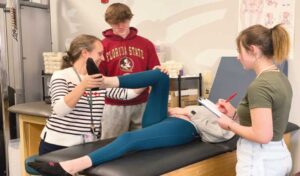
Laura Pinkman, left, a health care science instructor at Hunterdon County Polytech Career & Technical High School, engages students in an exercise science and sports medicine lesson.
The COVID-19 pandemic put a spotlight on health care workers as real-life superheroes, and that critical role includes nurses and other medical practitioners who moved from patient care into teaching the next generation of professionals.
Career-focused programs in health care are popular among students at all of New Jersey’s county vocational-technical high schools. These programs are relevant and effective because they are taught by experienced health professionals who inspire their students by sharing the expertise and experiences they gained in the field. Across the state, many health care heroes have stepped into new roles as teaching superstars.
Hunterdon County Vocational School District named Lana Shanahan, a registered nurse who served as the health care science/pre-nursing instructor, as Teacher of the Year. Students in the Hunterdon County Polytech Career & Technical High School program recognized the passion and knowledge Shanahan brought into their classroom.
“Sometimes I feel like I can almost be a nurse just because of her stories and the lessons she has taught us,” student Anna Murray said.
Shanahan also helped students and staff navigate the pandemic with what her colleagues described as “professionalism and kindness.”
Diane Carey teaches in a four-year program at Bergen County Technical High School, Paramus, called health care occupations. As the name suggests, the program takes a broad look at the health care field to introduce students to a range of career options, and, as Carey explained, “leaves pathways open to students based on their interests and abilities.”
Carey is just the person to lead this program. A registered nurse, she began her career in hospice and home care and also worked in pediatrics. She then attended Rutgers Law – Newark and went on to work for a medical malpractice firm and then in-house for a client. She moved into hospital administration in legal risk management and patient safety, and taught in post-secondary institutions before beginning full-time as a high school career and technical education teacher.
This position at Bergen County Tech is a perfect fit; it allows her to share her range of career experiences with students who are at the earliest stages of planning their own futures.
“Health care careers can be intimidating; you encounter life and death situations and deal with people in serious, difficult times,” Carey said. “But, if students are empowered and confident, they can take advantage of the rich opportunities for growth in this field. That’s why we start students early.”
Behind the hospital beds and medical devices in Carey’s classroom is an alumni board that highlights students’ successes. It is proof that her words and influence as a teacher have had tremendous impacts.
“The alumni keep in touch; they keep me informed, and that reminds me why I am here,” she said. “It is so amazingly rewarding.”
Cathy Bienkowski, another registered nurse who has transitioned into the classroom, agreed that student success stories are the greatest rewards of the job. As instructor for the four-year Academy for Health Care Science at Morris County Vocational School District, she has enjoyed seeing students move through her program and then go “above and beyond’’ to tackle the next phase of their educational journeys. “Most, but not all, go to four-year-plus programs,” she said. But all, she noted, “grow into incredible adults, making good decisions and becoming warm professionals.”
The idea of putting nursing skills to work in a classroom was new for Bienkowski.
“I would encourage others to explore this option,” she said. “When I was in nursing school, I didn’t know this was a possibility. I will always be a nurse first, but, luckily, I can teach what I love.”
Lauren Nervegna, a registered nurse who teaches “Dynamics of Healthcare” at the four-year Union County Academy for Allied Health Sciences, recently completed the “alternate route” to earn a teacher certification at the specialized high school she graduated from. She became aware of the option to become a career and technical education teacher when looking into a job posting from the academy — her alma mater. Once she was offered the job, she began working toward certification through virtual coursework and in-person classes on select Saturdays. She completed that program in two years, teaching simultaneously.
“I could not be happier with this career decision; it has brought me full circle, back to the place that nurtured my own interests in health care,” she said. “Now, I can do the same thing for students.”
It’s not just health care teachers who are in demand. County vocational-technical schools also seek professionals from a variety of technology and trade fields who can bring valuable experience and a workplace perspective to classrooms. And, that perspective is something students value.
“Our students come to class every day with so many questions,” Nervegna said. “They want to know what it is like to be a health care professional. They want to learn how to give others positive experiences in health care or turn their own negative experiences into positive ones for others. They are ready to make a difference, and we, as teachers, can help them do that.”
Laura Pinkman, another favorite among students in Hunterdon County Polytech’s health care science program, finds that student interaction to be very rewarding.
“A career and technical education program like the one I teach affords me time with the students, every day, five days a week,” said Pinkman. “We discuss the realities of the professions they are interested in and the skills they will need, from empathy to acceptance, to deal with a diverse and often vulnerable population.”
Pinkman, who started her career as a high school athletic trainer, also appreciates the time she has with students to help them explore different career paths within the health care field.
“I love being part of their career exploration,” she said. “We develop a strong bond over this two-year program, so they feel comfortable discussing options with me.”
Read this article as it originally appeared in ROI-NJ March 23.



